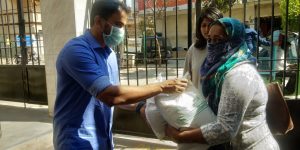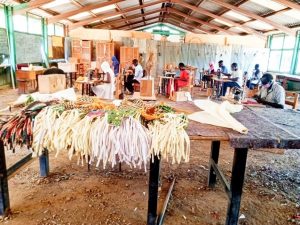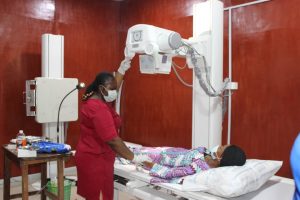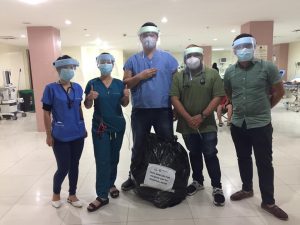India:
 The coronavirus pandemic was first confirmed in India on 30 January 2020, in the state of Kerala. As of now, in India there are over 120,000 confirmed cases of the virus and over 3,000 deaths have been reported. The whole country of over 1.33 billion is on lock-down with physical distancing being practiced to help curb the spread of the virus. However, these measures are having very serious repercussions on the livelihoods of the poor and the vulnerable. Life is especially difficult and miserable for the group who are categorised as the ‘daily wage labourers’. Though the government has announced many relief packages, they are limited when faced with a population the size of India. Those most affected by the small supply and scarcity of relief available are the destitute, daily wage labourers, pavement dwellers, slum dwellers, persons without access to government-provided food grains, and migrant workers.
The coronavirus pandemic was first confirmed in India on 30 January 2020, in the state of Kerala. As of now, in India there are over 120,000 confirmed cases of the virus and over 3,000 deaths have been reported. The whole country of over 1.33 billion is on lock-down with physical distancing being practiced to help curb the spread of the virus. However, these measures are having very serious repercussions on the livelihoods of the poor and the vulnerable. Life is especially difficult and miserable for the group who are categorised as the ‘daily wage labourers’. Though the government has announced many relief packages, they are limited when faced with a population the size of India. Those most affected by the small supply and scarcity of relief available are the destitute, daily wage labourers, pavement dwellers, slum dwellers, persons without access to government-provided food grains, and migrant workers.
Don Bosco Aid supported the response of: 1) Salesian Province in Bangalore (INK) with €15,000 emergency grant from Misean Cara, 2) Salesian Province in Hyderabad (INH) with €11,350 with emergency grant from Misean Cara, 3) Salesian Province in Chennai (INM) with €12,592 reallocated from the existing Misean Cara project 4) BoscoNet – Salesian national network based in New Delhi with €2,200 reallocated from the existing Misean Cara project.
Kenya:
 Turkana County in Kenya houses Kakuma Refugee Camp, which is the second largest refugee camp in East Africa, with a population of 250,000 refugees. Youth and children represent about 70% of the total population in the camp. The Salesians of Don Bosco are the only organization living in the midst of the refugees within the Kakuma Refugee Camp. As such any issues that affect refugees are directly experienced by the Salesians of Don Bosco in the camp. It is an edifying testimony of living amongst the most marginalised.
Turkana County in Kenya houses Kakuma Refugee Camp, which is the second largest refugee camp in East Africa, with a population of 250,000 refugees. Youth and children represent about 70% of the total population in the camp. The Salesians of Don Bosco are the only organization living in the midst of the refugees within the Kakuma Refugee Camp. As such any issues that affect refugees are directly experienced by the Salesians of Don Bosco in the camp. It is an edifying testimony of living amongst the most marginalised.
Don Bosco Kakuma has five institutions in the camp plus a parish and its 10 outstations reach out to more than 3000 youths and 7000 members from the larger refugee camp. With the spread of COVID-19 in Kenya, Don Bosco Kakuma aims at rescuing very vulnerable young refugees from the imminent danger of a wide-spread COVID-19 infection and its devastating consequences, by providing them with detergent-filled water tanks, protective masks, sanitizers, food stuffs, awareness campaign materials and continuous learning through social media.
Don Bosco Aid supported this response with €14,400 Misean Cara emergency grant.
Nigeria:
 For over 37 years the Salesians of Don Bosco in Nigeria have been involved in social development, empowerment of youth, community development and training. Over the years the organisation has operated a health facility in Akure, an online radio station, Technical Vocational Education Training, a campaign against irregular migration, provision of drinkable water, sanitation and health programmes, Child Protection Centres and advocacy. The Don Bosco health Centre in Akure is run by the Salesians for the purpose of primary health education and care, paying prime attention to laboratory services. In response to the spread of Coronavirus the Salesians in Akure provide support in terms of hygiene materials, PPEs for health workers, medical supplies (for treatment of persons with underlining health issues), materials to support preventive steps and create awareness about Coronavirus within the communities in Akure and its environs who are affected by the outbreak of the Coronavirus and the shutdown order issued by the State Government.
For over 37 years the Salesians of Don Bosco in Nigeria have been involved in social development, empowerment of youth, community development and training. Over the years the organisation has operated a health facility in Akure, an online radio station, Technical Vocational Education Training, a campaign against irregular migration, provision of drinkable water, sanitation and health programmes, Child Protection Centres and advocacy. The Don Bosco health Centre in Akure is run by the Salesians for the purpose of primary health education and care, paying prime attention to laboratory services. In response to the spread of Coronavirus the Salesians in Akure provide support in terms of hygiene materials, PPEs for health workers, medical supplies (for treatment of persons with underlining health issues), materials to support preventive steps and create awareness about Coronavirus within the communities in Akure and its environs who are affected by the outbreak of the Coronavirus and the shutdown order issued by the State Government.
Don Bosco Aid supported this response with €8,000 Misean Cara emergency grant.
Philippines:
 As the spread of COVID-19 reached the Philippines, Don Bosco Aid supported the initiatives of Don Bosco Pasil and Don Bosco Liloan particularly in the production of face shields and personal protective equipment.
As the spread of COVID-19 reached the Philippines, Don Bosco Aid supported the initiatives of Don Bosco Pasil and Don Bosco Liloan particularly in the production of face shields and personal protective equipment.
€2,200 were reallocated from the existing Misean Cara project for COVID-19 emergency response.
South Africa:
In South Africa, Don Bosco Aid supported COVID-19 Emergency Response of Three2Six projects catering for children of refugees and migrants, providing them with education and food.
€600 was reallocated from the existing Misean Cara project.
 The coronavirus pandemic was first confirmed in India on 30 January 2020, in the state of Kerala. As of now, in India there are over 120,000 confirmed cases of the virus and over 3,000 deaths have been reported. The whole country of over 1.33 billion is on lock-down with physical distancing being practiced to help curb the spread of the virus. However, these measures are having very serious repercussions on the livelihoods of the poor and the vulnerable. Life is especially difficult and miserable for the group who are categorised as the ‘daily wage labourers’. Though the government has announced many relief packages, they are limited when faced with a population the size of India. Those most affected by the small supply and scarcity of relief available are the destitute, daily wage labourers, pavement dwellers, slum dwellers, persons without access to government-provided food grains, and migrant workers.
The coronavirus pandemic was first confirmed in India on 30 January 2020, in the state of Kerala. As of now, in India there are over 120,000 confirmed cases of the virus and over 3,000 deaths have been reported. The whole country of over 1.33 billion is on lock-down with physical distancing being practiced to help curb the spread of the virus. However, these measures are having very serious repercussions on the livelihoods of the poor and the vulnerable. Life is especially difficult and miserable for the group who are categorised as the ‘daily wage labourers’. Though the government has announced many relief packages, they are limited when faced with a population the size of India. Those most affected by the small supply and scarcity of relief available are the destitute, daily wage labourers, pavement dwellers, slum dwellers, persons without access to government-provided food grains, and migrant workers. Turkana County in Kenya houses Kakuma Refugee Camp, which is the second largest refugee camp in East Africa, with a population of 250,000 refugees. Youth and children represent about 70% of the total population in the camp. The Salesians of Don Bosco are the only organization living in the midst of the refugees within the Kakuma Refugee Camp. As such any issues that affect refugees are directly experienced by the Salesians of Don Bosco in the camp. It is an edifying testimony of living amongst the most marginalised.
Turkana County in Kenya houses Kakuma Refugee Camp, which is the second largest refugee camp in East Africa, with a population of 250,000 refugees. Youth and children represent about 70% of the total population in the camp. The Salesians of Don Bosco are the only organization living in the midst of the refugees within the Kakuma Refugee Camp. As such any issues that affect refugees are directly experienced by the Salesians of Don Bosco in the camp. It is an edifying testimony of living amongst the most marginalised. For over 37 years the Salesians of Don Bosco in Nigeria have been involved in social development, empowerment of youth, community development and training. Over the years the organisation has operated a health facility in Akure, an online radio station, Technical Vocational Education Training, a campaign against irregular migration, provision of drinkable water, sanitation and health programmes, Child Protection Centres and advocacy. The Don Bosco health Centre in Akure is run by the Salesians for the purpose of primary health education and care, paying prime attention to laboratory services. In response to the spread of Coronavirus the Salesians in Akure provide support in terms of hygiene materials, PPEs for health workers, medical supplies (for treatment of persons with underlining health issues), materials to support preventive steps and create awareness about Coronavirus within the communities in Akure and its environs who are affected by the outbreak of the Coronavirus and the shutdown order issued by the State Government.
For over 37 years the Salesians of Don Bosco in Nigeria have been involved in social development, empowerment of youth, community development and training. Over the years the organisation has operated a health facility in Akure, an online radio station, Technical Vocational Education Training, a campaign against irregular migration, provision of drinkable water, sanitation and health programmes, Child Protection Centres and advocacy. The Don Bosco health Centre in Akure is run by the Salesians for the purpose of primary health education and care, paying prime attention to laboratory services. In response to the spread of Coronavirus the Salesians in Akure provide support in terms of hygiene materials, PPEs for health workers, medical supplies (for treatment of persons with underlining health issues), materials to support preventive steps and create awareness about Coronavirus within the communities in Akure and its environs who are affected by the outbreak of the Coronavirus and the shutdown order issued by the State Government. As the spread of COVID-19 reached the Philippines, Don Bosco Aid supported the initiatives of Don Bosco Pasil and Don Bosco Liloan particularly in the production of face shields and personal protective equipment.
As the spread of COVID-19 reached the Philippines, Don Bosco Aid supported the initiatives of Don Bosco Pasil and Don Bosco Liloan particularly in the production of face shields and personal protective equipment.